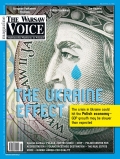

The Warsaw Voice | 17 wrzesień 2008

* Pokazana okładka tytułu jest aktualną okładką tytułu The Warsaw Voice. Kiosk24.pl nie gwarantuje, że czytany artykuł pochodzi z numeru, którego okładka jest prezentowana.
Michał Boni, head of Prime Minister Donald Tusk’s team of strategic advisers, talks to Danuta Górecka and Andrzej Jonas.
- You are the founder and head of this opinion-forming and advisory team. Analyses, evaluations of the socioeconomic situation of Poland, compilation of strategic plans for the government… Wouldn’t it be better to be a minister in the government?
Dealing with different aspects of development, or something that today is defined as development policy and development economics, is far more interesting. You have to learn new things and the past couple of months have been a huge leap for me when it comes to opportunities to learn about new fields. I get intellectual satisfaction from it and that is something a job in the administration doesn’t have, because it’s boring, arduous and hard.
- Do you think that Donald Tusk’s Cabinet is too immersed in dealing with pressing, current problems—just like the experts and advisers of all Polish governments after 1990? Is too little time spent on forward planning?
When the political and economic transformation of the country began 20 years ago, making strategic plans was very hard, as no other country had such experience. On the other hand, decisions which were made at the time and discussions on premises for those decisions all added up to a strategic debate on the future shape of Poland. Later, we had several staging posts that shaped government strategy. Those landmarks included joining NATO and, later, the EU. Whether we were capable of making the best of those moments is a different story. The EU set certain conditions,
operational programs were established. For example, Poland had to draw up a national development strategy until 2013 in conjunction with the 2007-2013 operational program concerning EU funds. When we worked on such documents back at the beginning of the transformation period, we were not yet capable of identifying the challenges of 20-plus years ahead. As for the intellectual resources of consecutive governments, they were pretty good in the sense of the intellectual potential of people, centers and institutions. Politicians in various countries, on the other hand, have never had any special skills in strategic thinking and Poland is no different. For them, concerning themselves with what will happen beyond the next elections or in 20 years is a fairy tale, whereas in reality, this fairy tale is crucial to ask oneself fundamental questions from time to time. For example, we have to ask ourselves this: are we developing and building our future consciously or is Poland just drifting on the wave of the current boom in the economy, propelled by economic growth and EU funds? If we do not want to be drifting, if we want to consciously build tools to support development, we have to realize there is no universal solution, that it all takes an intellectual and strategic debate aimed at identifying goals and the means to achieve the goals.
(...)
Artykuł w całości jako plik PDF do pobrania znajduje się w zakładce Opis w ofercie tytułu The Warsaw Voice
 Wróć do czytelni
Wróć do czytelni